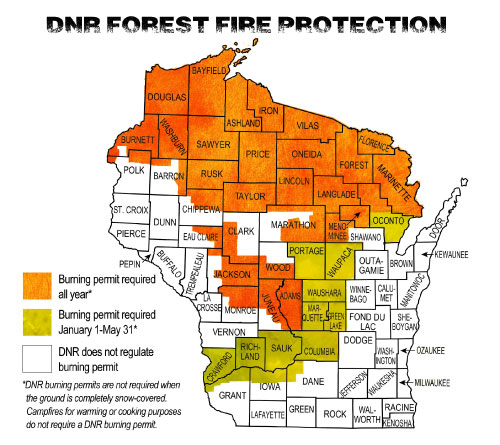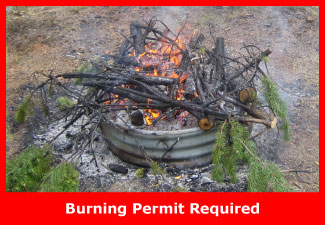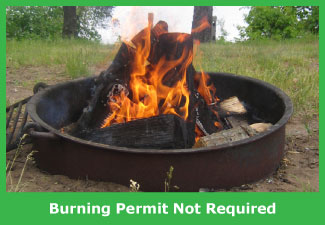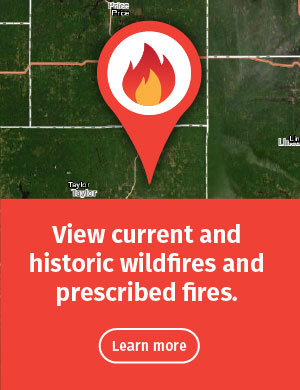Wisconsin Burning Permits
Burning permits are required by the Wisconsin DNR in many parts of the state to conduct legal and responsible burning in the outdoors. Burning permits are free and easy to obtain. They encourage the public to burn safely and are proven to be effective in protecting lives, property and natural resources from the damages of wildfires.
Steps to safe burning
- Get a permit: Obtain a free permit online instantly with an email address. Or call the hotline 1-888-WIS-BURN (947-2876) from 7 a.m. to 10 p.m. daily to have a burning permit mailed to you.
- Check before burning: After 9 a.m. on the day you wish to burn, check the daily burning restrictions and select the county where you plan to burn. Fire conditions change quickly, so it's important to check each day you burn to find out if burning is allowed, burning hours and any size limitations.
- Follow the rules: Follow the daily burning restrictions and fire safety recommendations listed on the permit. Make sure to have all the necessary tools to keep your fire contained. Lastly, make sure your fire is completely out before leaving.
- Safe Burning: Burn Responsibly or Don't Burn At All! [PDF]
- Hlawv Kom Xyuam Xim [PDF]
- Bezpieczne Palenie Odpadów [PDF]
- Incineración Seguro [PDF]
Special permits
Upon DNR inspection, special permits may be issued for burning outside the restricted burn times, land clearing and piles or prescribed burns exceeding the maximum size limit. Maximum pile sizes and acreages are limited by geographic area and indicated within the daily burning restrictions. Contact your local DNR Ranger Station or DNR dispatch office [PDF] for more information.
Businesses or commercial entities
Businesses or commercial entities burning waste materials, including waste generated off-site by individuals, is not valid under this annual permit but may be eligible for a solid waste wood burning facility license. Contact the DNR solid waste specialist for your area prior to any burning.
More information about burning permits
DNR burning permits are issued annually to a person, not to a specific address and are non-transferable. Your burning permit is assigned to you, as an individual and can be used anywhere in the state that a DNR burning permit is required as long as you have complied with local and state burning laws. Remember to check the daily burning restrictions before burning.
Contact your local DNR office, fire department, town chairperson or local municipal official if you have any questions on the burning regulations where you plan to burn.
Burn location
Burning permits are required in DNR forest fire protection areas (see map below) to conduct burning of legal materials when the ground is not completely snow-covered.
DNR burning permits do not apply within incorporated cities and villages. These municipalities often can and do create their own burning permit requirements. In addition, some townships may choose to be much more restrictive than state law and may not allow burning at any time. Regardless of where you burn, it is up to you check with your local municipality for their regulations, even if you have obtained a DNR burning permit.
Not sure if your burn location falls within DNR forest fire protection? For a more detailed look, zoom-in to your location on the burning restrictions map.
Safety tips
Avoid burning in the spring! The safest time to burn is when the ground is completely snow-covered. Throw a tarp over legal materials and wait until snow accumulates and will remain on the ground for the duration of your burn.
Debris burning is the number one cause of wildfires in Wisconsin. Using fire as a method to dispose of vegetative yard waste isn't the only option. While debris burning is legal in most places, let's face the facts...it's unsafe, unhealthy and a nuisance. If you choose to burn, follow these simple guidelines to ensure you are burning safely.
Before burning
- Find alternatives to burning debris before deciding to burn.
- Obtain proper burn permits and follow any restrictions.
- Comply with local ordinances that may be more restrictive than state law.
- Make certain you are only burning legal materials.
- Keep an eye on the weather and avoid burning under windy conditions.
- Make certain the area adjacent to the fire is free of all flammables.
During burning
- Have a water source and firefighting tools handy.
- Keep the size of the fire small and manageable.
- Maintain a mineral soil firebreak around the burn area.
- Never leave your fire unattended.
- If weather conditions change for the worst, put the fire out.
- If your fire escapes, dial 911 immediately!
After burning
- Make sure the burn is completely out before leaving.
- Use lots of water, drown, stir and repeat until cold.
- Go back and check again later for any remaining smoke or embers.
- Fun fact: use cold ashes from your burn as a bed for your garden. It makes a great fertilizer!
Legal materials
Burning permits are issued to individuals wishing to burn small amounts of yard debris or clean wood from a single family household on the property where it was generated either on the ground or in burn barrels. This includes prescribed or broadcast burns for land management purposes.
Allowed
- Brush
- Leaves
- Pine needles
- Grass
- Clean wood
- Unrecyclable paper*
- Unrecyclable cardboard*
*Recycling of clean paper and cardboard is required by law!
NOT allowed
- Garbage
- Plastics
- Shingles
- Foam
- Structures
- Furniture
- Wire
- Metal
- Electronics
- Vinyl products
- Rubber products
- Oil-based products
- Painted, stained or treated wood
Always consider alternatives to burning
- Reuse: Find someone else who can use it, have a yard sale or donate. Bring reusable shopping bags to the grocery store. Leave grass clippings on the lawn; they contain nutrients.
- Recycle: Separate newspaper, magazines, cardboard, paper, glass, plastic and aluminum, steel or tin cans.
- Dispose: Discard non-recyclable waste materials at a licensed landfill.
- Compost: Mulch or collect leaves and plant clippings for composting or move brush piles in the woods for wildlife habitat.
- Chip: Collect brush and clean wood to make mulch or decorative chips, or use as heating fuel in fireplaces.
- Wait: Avoid burning in the spring. The safest time to burn is when the ground is completely snow-covered. Throw a tarp over legal materials and wait until it snows.
Campfires
If you are burning in a campfire ring or fire pit with the intent to eliminate debris, a DNR burning permit is required. However, small fires for warming or cooking purposes do not require a DNR burning permit and are allowed anytime of the day, except during Emergency Burning Restrictions.
Even campfires in a fire ring or fire pit can cause a wildfire! Be aware of the daily fire danger before conducting any burn in the outdoors.
Know the risks
Weather conditions and moisture content in vegetation play the biggest role in how wildfires start and spread. Therefore, the time of year and even the time of day influences how burning is regulated. Spring is Wisconsin's peak fire season and when most fire restrictions are in effect. This occurs shortly after the snow-cover disappears and prior to vegetation greening.
In addition, burning is typically restricted to late afternoon or evening hours to reduce the chances of a fire escaping. In the evening, winds are calmer, humidity rises and temperatures are cooler. Always keep an eye on the changing weather conditions and stay within the specified burn times and size limitations as indicated by the daily restrictions.
Understand the risks
Permit holders must comply with all the conditions associated with the burning permit and take all reasonable precautions to prevent escape of the fire. The person responsible for lighting the fire is required to have a valid burning permit with them at all times while burning and must be available to present to law enforcement or firefighters if requested. If you fail to obtain a burning permit, do not comply with the daily fire restrictions or allow your fire to escape, you may be cited by law enforcement.
Remember, lighting any fire in the outdoors is risky. If you choose to burn and your fire escapes and starts a wildfire, you are liable for all suppression costs and potentially any damages associated with that fire. At any point if you are uncomfortable with your burn, do not hesitate to dial 911 immediately.




